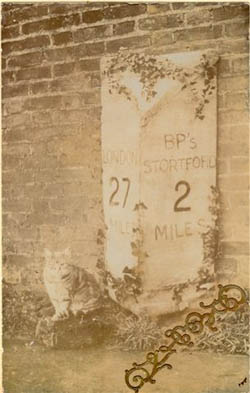From the Thorley
Archives
Justice in Thorley
Some years ago Miss D.M. Sortwell transcribed
records from the Hertford Quarter Session Court Rolls for the
years 1581 to 1894 as they related to the village of Thorley. The
Quarter Sessions court at Hertford was where Justices of the
Peace were responsible for dealing with cases of theft, civil
disturbance and maintenance orders for illegitimate children.
Unfortunately the records usually only detailed the charge and
the resulting action is not recorded. JPs also issued warrants
for the office of parish constables, licences for gamekeepers
plus badgers and kidders (small-time itinerant salesmen) and
drovers (cattle dealers). Here are some of the 'edited
highlights' as they concerned the population of our original
village.
In 1628 Matthew Creede appeared before the
magistrates for 'keeping an alehouse without licence.'
In October 1654 Mr Richard Godfrey of Thorley
was sworn in as Chief Constable of Braughing, the then 'District
Council' for the Bishop's Stortford area.
Michaelmas 1687 Daniel Hatton was licensed as a
badger and Midsummer 1699 Joseph Lamb was granted a licence as a
drover.
In 1640 Andrew Carter was indicted for placing
five loads of dung near the river at Spellbrooke so that the said
river was polluted.
In January 1651 Edward Pett of Thorley, a
maimed soldier, under Capt. Humfrey, was awarded 20 shillings
'for the present relief of himself, his wife and 4 children'.
26th April 1661 - John Wives and George
Brannard of Thorley, yeoman were both indicted for not attending
church.
Sam Keggs in 1800 was committed to gaol for
three months, or until he pays the sum of £5, for fishing in a
pond belonging to the Rev. Thos. Pennington.
In the Sessions Volume 9, covering 1823 to 1833,
a minor crime wave occurred. Individuals from Thorley were
convicted for various offences including stealing a dog, taking a
sheaf of corn, poaching with nets, stealing plants and turnips.
Abraham was required to keep the peace towards his wife Esther
whilst a labourer was convicted as a rogue and a vagabond.
Convictions were also recorded for two men for 'damaging grass'.
Where or how is not recorded. Both men were fined one shilling.
There are several instances where the parish of
Thorley was reported to the Quarter Sessions court requiring them
to repair the main London to Newmarket road.

|
1807.….. that a certain part thereof
lying in the parish beginning 930 yds beyond the 27th
milestone from London & ending at the 28th
milestone……. are in decay and the inhabitants
of the parish of Thorley ought to repair the same. |
The 27th Milestone
Photographed in 1911
|
|
Geoffrey Harris has researched his Thorley
ancestor who, in 1864, was transported to Australia for setting
fire to two barley stacks belonging to Mr T. Phipps, Thorley. (Sampford's
Lane leading to Butler's Hall).
James Collins appeared before the Hertfordshire
Lent Assizes in March 1863. The evidence given was that 'on the
evening of 4th January 1863 James Collins was drinking in the
Green Man Public House ……. His immediate neighbour
named Seabon heard him come home and leave a short time later
…... he heard him calling for matches. Seabon went outside
and saw the stack on fire with Collins in the field nearby
throwing stones …"he behaved strangely when he was
drunk" …….. At about 5 a.m. P.C. Astler heard of
the fire and went to Collins' cottage …. and later arrested
him. On the way to the lock up he stated that he had been working
for Mr Fowler at Thorley Hall farm thrashing in the barn (St
Barnabas barn?) and he was not going to work anymore for 10
shillings per week. He then admitted arson.'
He was sentenced to penal servitude for eight
years. He left England 1st July 1864 on the ship the "Merchantman"
and arrived at Freemantle, Western Australia, 12th September 1864.
A ticket of leave was granted 19th June 1866 and a conditional
pardon on 18th June 1872. Geoffrey's last record for his ancestor
shows him working as a labourer in York, Perth.
James Collins proved to be the last of eight
men from Thorley to be sentenced to transportation to Australia
between 1807 and 1864.
Bill Hardy
November 2003
From the
Archives